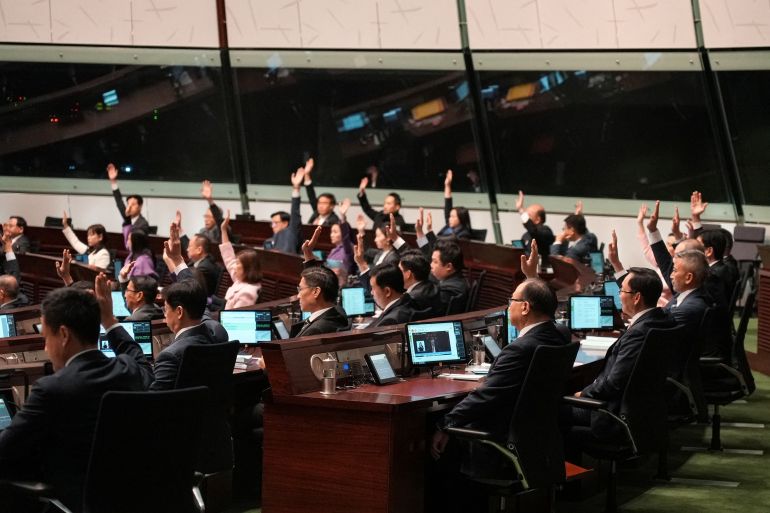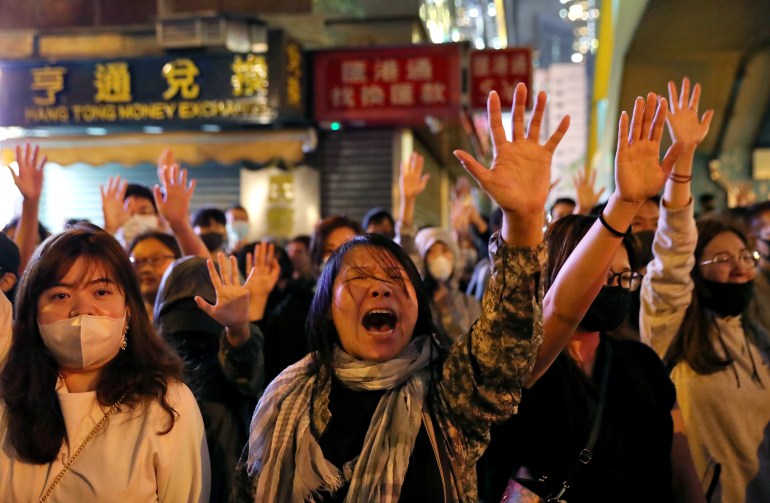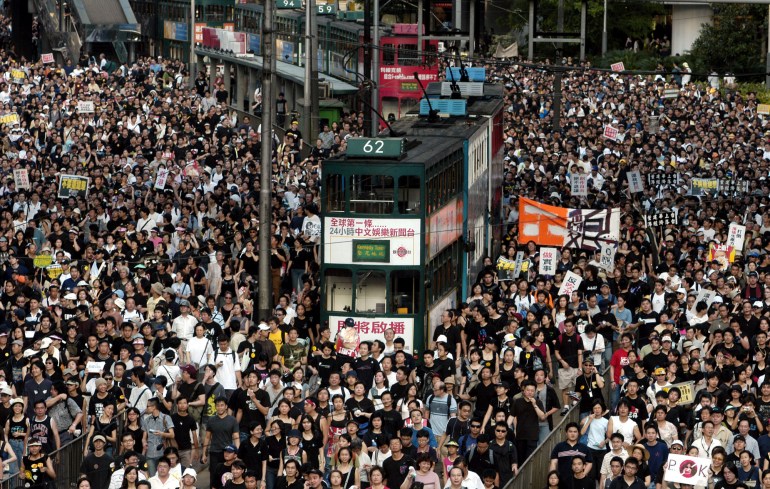Article 23: Hong Kong legislature passes tough new national security law
Rights groups, foreign governments fear fast-tracked law will erode civil liberties and may be used to silence critics.

Hong Kong’s Legislative Council unanimously passed a new national security law that expands the government’s power to crush dissent.
The Safeguarding National Security Law passed on Tuesday includes new measures on treason, espionage, external interference, state secrets and sedition.
Keep reading
list of 4 itemsHong Kong jails 12 for storming legislature in 2019
Hong Kong prepares tough new national security punishments
For foreign firms in Hong Kong, national security plans bring fresh chill
“Today is a historic moment for Hong Kong,” said Chief Executive John Lee, who added that the law punishing five major crimes would go into effect on March 23.
It grants the government more power to quash dissent, widely seen as the latest step in a sweeping political crackdown that followed the mass protests of 2019.

It comes on top of similar legislation – the National Security Law – imposed by China in 2020, which has already largely silenced opposition voices. The Chinese and Hong Kong governments say that law restored stability after the 2019 protests.
Critics say that Tuesday’s legislation, known as Article 23, further threatens the China-ruled city’s freedoms.
“It makes the National Security regime much more comprehensive,” John Burns, an honorary professor at the University of Hong Kong, told Al Jazeera. “It includes a whole raft of things that were not crimes before or that were colonial crimes, but they have updated the crimes, they have increased the penalty.”
‘Full-speed’ enactment
The 90-seat council stacked with pro-China loyalists was first presented with the bill on March 8, following a monthlong public consultation, with Hong Kong’s leader calling for it to be enacted at “full speed“.
Eighty-eight politicians and the council’s president voted unanimously to enact the legislation.
The law threatens stringent penalties for a wide range of actions authorities call threats to national security, with the most severe – including treason and insurrection – punishable by life imprisonment.
Lesser offences, including the possession of seditious publications, could also lead to several years in jail. Some provisions allow criminal prosecutions for acts committed anywhere in the world.
Those found guilty of treason could face sentences of up to life imprisonment, while those convicted of breaching state secrets or espionage could face 10 and 20 years respectively. Punishments relating to alleged collusion with foreign forces will also be increased, particularly if people are deemed to be working together rather than alone.
Penalties have been increased for sedition, currently addressed under a colonial-era law, to between seven and 10 years from two. And in contrast with the internationally accepted standard for sedition, the new law says that people can be charged with the offence even without an element of violent intent.
Other provisions include allowing police to detain suspects for two weeks before charging them, compared with 48 hours currently, and giving police the ability to apply for permission to remove a defendant’s right to a lawyer while in pre-charge detention. The bill also allows the authorities to cancel the passports of “absconders”.
Legislative Council President Andrew Leung said he believed all lawmakers were honoured to have taken part in this “historic mission”.
In 2003, an attempt to pass a version of the law led to a street protest that drew half a million people, leading to the withdrawal of the legislation.

Former legislator Emily Lau told Al Jazeera the situation had changed a lot since then. “If you ask the people here, they will tell you – or rather they dare not tell you. There are no demonstrations, no public assembly, it’s very quiet, eerily quiet,” she said.
In the council building, politicians said the new legislation was a necessary step to protect Hong Kong’s status as an international hub, one likening it to a front gate guarding the city’s people from danger.
‘Crushing blow to human rights’
Some human rights organisations and foreign governments have criticised the vagueness of Article 23 and said it may be used to silence critics.
Critics also worry that the new law will further erode civil liberties that China promised to preserve for 50 years when the former British colony returned to Chinese rule in 1997.
Amnesty International’s China director Sarah Brooks said in a statement: “With this draconian legislation, the Hong Kong government has delivered another crushing blow to human rights in the city.
“The passing of this law sends the clearest message yet that the Hong Kong authorities’ hunger to accommodate Beijing’s will outstrips any past commitments on human rights.
“This is a devastating moment for the people of Hong Kong, hundreds of thousands of whom have previously marched through the streets to demonstrate against repressive laws, including an incarnation of this one in 2003. Today they lost another piece of their freedom – any act of peaceful protest is now more dangerous than ever.”